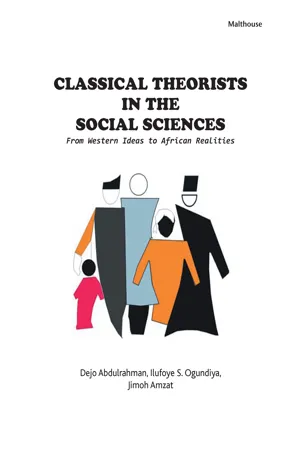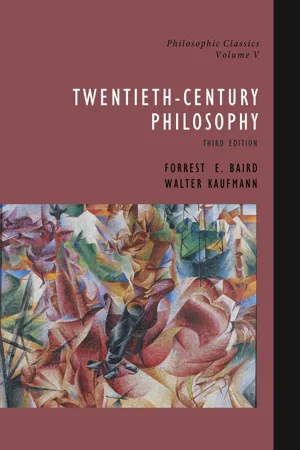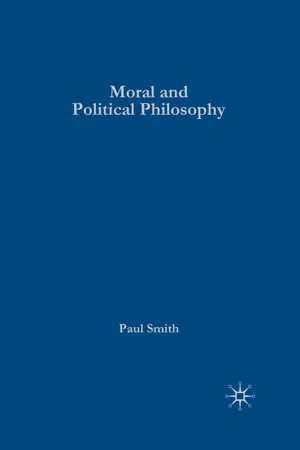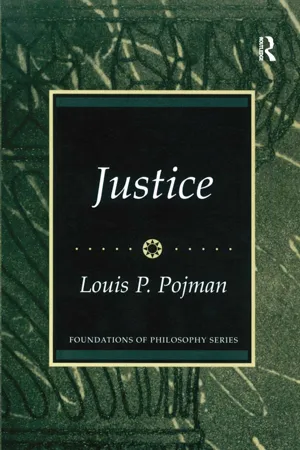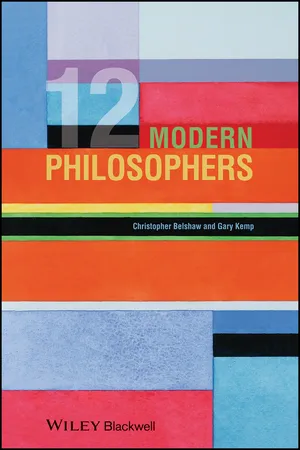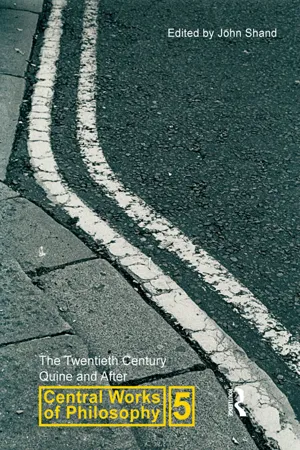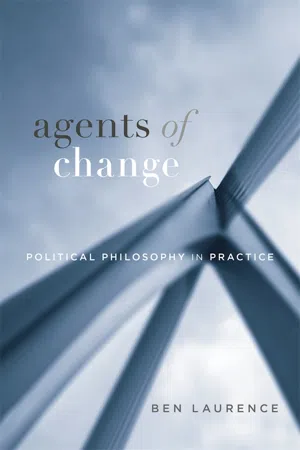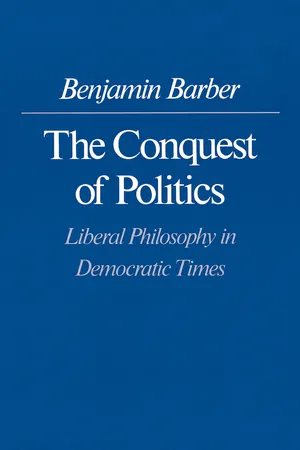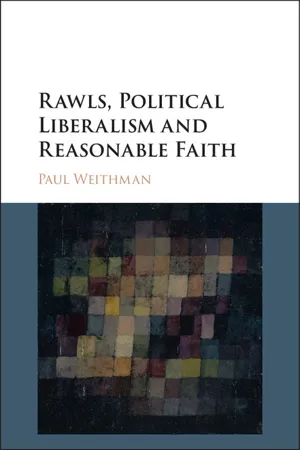Politics & International Relations
John Rawls
John Rawls was a prominent political philosopher known for his theory of justice as fairness. He argued that a just society is one that individuals would agree to under fair, impartial conditions. Rawls' influential work, "A Theory of Justice," has had a significant impact on political and ethical thought, particularly in discussions of distributive justice and the role of government in addressing social inequalities.
Written by Perlego with AI-assistance
Related key terms
1 of 5
11 Key excerpts on "John Rawls"
- eBook - PDF
Classical Theorists in the Social Scienc
From Western Ideas to African Realities
- Dejo Abdulrahman(Author)
- 2023(Publication Date)
- Malthouse Press(Publisher)
John Rawls (1985) defined justice as fairness. He identified that the primary subject of justice is the basic structure of society, or more exactly, the way in which the major social institutions distribute fundamental rights and duties and determine the division of advantages from social cooperation. By major institutions, Rawls referred to the political constitution and the principal economic and social arrangements. In this context, the legal protection of freedom of thought and liberty of conscience, competitive markets, private property in the means of production, and the monogamous family are examples of major social institutions (Rawls, 1999:6). As a challenge against utilitarian universalism, Rawls (1987:4) maintain that “a political conception of justice involves, so far as possible, no prior commitment to any wider doctrine. It looks initially to the basic structure and tries to elaborate a reasonable conception for that structure alone.” Against this background, Rawls (1999:3) argued that each individual person possesses an inviolability founded on justice that even the welfare of society as a whole cannot override. Background John Rawls was born in Maryland in the United States on February 21, 1921 (Weithman, 2009). He devoted his working life to philosophy, save for the exception of three years of military service during the World War II. He received his Ph.D. in philosophy at Princeton University in 1950 and taught briefly there and at Cornell University in 1962 before he was offered a professorship in philosophy at Harvard University (Follesdal, 2014). Before his death in 2002, he published several articles and books, including the famous A Theory of Justice, Justice as Fairness, Political Liberalism, The Law of Peoples, and Justice as Fairness: A Restatement, among others. A Theory of Justice, which was his first major book, emerged at a time that the Civil Rights Movements posed fundamental questions about social life and governance in the US. - eBook - ePub
Philosophic Classics, Volume V
20th-Century Philosophy
- Forrest Baird(Author)
- 2023(Publication Date)
- Routledge(Publisher)
OHN RAWLS 1921— DOI: 10.4324/9781003419778-16John Rawls was born in Baltimore, Maryland in 1921. After finishing his undergraduate work at Princeton University in 1943, he joined the army. With the end of World War II, he returned to Princeton and completed his Ph.D. in philosophy in 1950. He taught at Princeton before spending a year as a Fulbright Fellow at Christ Church, Oxford. On returning to the United States, Rawls taught at Cornell for six years before moving to Harvard in 1962. He remains at Harvard as a professor emeritus to this day.The author of numerous journal articles, Professor Rawls is known primarily for his influential book, A Theory of Justice, published in 1971. In this seminal work Rawls presents a classically liberal, egalitarian conception of justice as “fairness.” As he explains in our selection from the first chapter, justice is primarily concerned with the basic structure of society and the “characteristic set of principles for assigning basic rights and duties and for determining . . . the proper distribution of the benefits and burdens of social cooperation.” The goal is to find “the most appropriate moral basis for a democratic society.”Developing the social contract theories of Locke, Rousseau, and Kant, Rawls asks that we begin by placing ourselves behind a “veil of ignorance.” That is, let us imagine that we are asked to agree on those social structures that will insure justice without knowing what will be our particular place in the society we construct. What kind of a society would we choose if we did not know what our class position, our social status, our abilities, our intelligence level, our race or gender, or even our “psychological propensities” would be in such a society? While I might choose to construct a society that favored deep thinkers over manual laborers if I knew I was going to be a philosopher, would I choose such a society if I did not know what I would end up doing? A society in which artistic talent is highly rewarded might be preferable if I knew I was going to be a great singer or painter. But what if I found out that I was going to be incapable of carrying a tune or holding a paintbrush? Wouldn’t I want a different distribution of scarce resources? Or what if we could establish a utilitarian society where a few people would be oppressed so that the majority would have easier lives? Would I agree to such an arrangement without knowing to which group I would belong? Of course not! As Rawls notes, “Offhand it hardly seems likely that persons who view themselves as equals . . . would agree to a principle which may require lesser life prospects for some simply for the sake of a greater sum of advantages enjoyed by others.” - eBook - PDF
Moral and Political Philosophy
Key Issues, Concepts and Theories
- Paul Smith(Author)
- 2008(Publication Date)
- Palgrave Macmillan(Publisher)
12 John Rawls'S THEORY OF JUSTICE John Rawls's theory of justice, which he calls 'justice as fairness', is perhaps the most influential work in moral and political philoso- phy produced in the twentieth century. It has stimulated an enor- mous interest in political philosophy, particularly in the theory of social justice. Rawls aimed to develop social contract theory to offer a systematic account of justice as a superior alternative to utilitarianism.! That is, he asks which principles of justice would rational people agree to, for their own advantage, from a position of equality? In any society, there are two kinds of conflict that make prin- ciples of justice necessary. First, in any society, but especially in a liberal democracy, people have diverse and conflicting reli- gious, philosophical, moral and ethical beliefs. Consequently, they have diverse 'conceptions of the good', that is, conceptions of what is valuable in life. This diversity is reasonable, inevitable and permanent. Consensus on such beliefs and values cannot be expected. 2 Despite this diversity, are there principles of justice on which all reasonable citizens could agree? Since a society's politi- cal institutions and laws are coercively imposed on all its citi- zens, in order to be legitimate they must be based on principles that all reasonable citizens could endorse, whatever their beliefs and values. 3 Second, income and wealth are scarce relative to people's needs and wants, so members of any society also have conflict- ing interests over economic distribution. Are there principles of justice to determine the right distribution on which all citizens could agree? Rawls proposes his principles of justice as the most reasonable answer to these questions. 185 - 4 The Liberal Theory of Justice: John RawlsAll social primary goods—liberty and opportunity, income and wealth, and the bases of self-respect—are to be distributed equally unless an unequal distribution of any or all of these goods is to the advantage of the least favored.(A Theory of Justice, 1971 [henceforth TJ], p. 303)
John Rawls’s Theory of Justice as Fairness
In John Rawls’s theory of Justice as Fairness, we have what is probably the most important contribution to political philosophy in the twentieth century, one with which both friends and foes must come to terms. Stuart Hampshire called it “the most substantial and interesting contribution to moral philosophy since the [Second World] War [wherein] the substance of a critical and liberal political philosophy is argued with an assurance and breadth of mind that puts the book in the tradition of Adam Smith and Mill and Sidgwick.”1 Robert Nisbett calls it the “long awaited successor to Rousseau’s Social Contract, the Rock on which the Church of Equality can properly be founded in our time.” In scope and power, it rivals the classics of Hobbes, Locke, and Rousseau. Deservedly, no philosophical work in the last quarter of a century has been quoted or debated more than this one. Fundamentally egalitarian (see quotation above), it seeks to justify the welfare state. Rawls accepts that liberal ideas of justice can only be justified where the “circumstances of justice” obtain, that is, in a situation of relative affluence like those in Western nations. In his second book, Political Liberalism (Harvard, 1994), he clarifies his position as attempting to provide political stability. He recognizes our society as “a cooperative venture for mutual advantage” (TJ - Mark Van Hoecke(Author)
- 2004(Publication Date)
- Hart Publishing(Publisher)
First, each person participating in a practice, or affected by it, has an equal right to the most extensive liberty compatible with a like liberty for all; and secondly, inequalities are arbitrary unless it is reasonable to expect that they will work out for everyone’s advantage, and provided the positions and offices to which they attach, or from which they may be gained, are open to all. 47 Justice as fairness is conceived as a political concept independent of con-troversial philosophical, moral and religious doctrines. Rawls believes that rational people will unanimously adopt his principles of justice if their rea-soning is based on general considerations, without knowing anything about their own personal situation, cultural background or belief. The first princi-ples are constituted by a procedure of construction without appeal to prior moral facts. Although it is undeniable that there is some specific conception of the person at work in Rawls’ political constructivism, 48 persons do not ascend to the original position or the constitutional convention to discuss the nature of man and the meaning of personhood. Rather, they agree upon the fundamental terms of their association. Amongst others this implies set-ting up a legal system, defining the basic structure within which the pursuit of all other activities takes place. 49 Rawls’ characterisation of his theory as political has an important consequence for the scope of these two principles of justice: they only cover the ‘basic structure’ of society, 50 and regulate only those institutions directly whose regulation is needed to bring about a just distribution of rights, opportunities, and wealth. 51 They do not regulate institutions that are irrelevant to the distribution of these goods and do not apply directly to the internal life of the many associations within society, ‘the family among them’. 52 Rawls’ original theory does not apply to questions of ‘local’ justice.- eBook - PDF
- Christopher Belshaw, Gary Kemp(Authors)
- 2009(Publication Date)
- Wiley-Blackwell(Publisher)
2 RAWLS THOMAS BALDWIN John Rawls (1921–2002) was the most important political philosopher of the latter half of the twentieth century. His major work, A Theory of Justice (1971), gave a new impetus to political philosophy, providing a fresh approach which transformed familiar debates. It is still the starting point for contemporary discussion. 1 Life Rawls grew up in Baltimore and entered Princeton University in 1939; after graduating in 1943 he served in the US Army, and he was in the Pacific in August 1945 when a nuclear bomb was dropped on Hiroshima, an act he later condemned as a great wrong. 1 After the war, he returned to Princeton and completed a PhD in philosophy in 1950. In 1952 he was awarded a Fulbright scholarship which enabled him to spend the year 1952–3 in Oxford. He returned to the USA to an academic position at Cornell, where he taught from 1953 until 1959. The Cornell Philosophy Department was then strongly influenced by Wittgenstein’s work, and Rawls’s writings from this period show this influence. In 1959 he moved to Harvard, first just for one year, and Publisher's Note: Permission to reproduce this image online was not granted by the copyright holder. Readers are kindly requested to refer to the this chapter. printed version of Rawls 35 then, after a two-year spell at MIT, for the rest of his career. The dominant philosopher at Harvard at this time was W. V. Quine, whose influence can also be seen in Rawls’s writings. The publication of A Theory of Justice in 1971 2 brought him both fame and controversy; and his work thereafter was largely taken up with defending, refining, revising, and extending the position he had there advanced. He was appointed James Bryant Conant University Professor at Harvard in 1979. He retired in 1991, but continued to teach until inca-pacitated by a stroke in 1995. Despite his fame, Rawls was an exceptionally modest individual. - eBook - ePub
Central Works of Philosophy v5
Twentieth Century: Quine and After
- John Shand(Author)
- 2014(Publication Date)
- Routledge(Publisher)
The first section discusses the aspects of Rawls’s view that follow from its aim to provide a moral basis for a democratic society. The next three sections then take up the major parts of that argument. The second discusses what Rawls calls “the two principles of justice” as well as some of the institutions and policies that might be necessary to realize them. The third examines the “original position”. The fourth looks at Rawls’s arguments that a society based on his conception of justice, “justice as fairness”, would be stable.Before beginning the discussion of A Theory of Justice in earnest, however, there is a complication that needs noting. There is an important sense in which A Theory of Justice is not a single book, but three. Rawls published A Theory of Justice in 1971. In preparation for its translation into German in 1975, Rawls revised the original text. All subsequent translations followed the revised text. This text was finally published for the first time in English in 1999, and it is this revised edition to which this essay refers. After 1975, Rawls continued to think about the material in A Theory of Justice. In 1993, he published Political Liberalism, which takes up the question of democratic legitimacy and sets out the context in which he came to think the arguments for justice as fairness were best made. Situating justice as fairness within political liberalism required some new conceptual machinery and some changes in the presentation of the view, but no serious substantive revisions. In 2000, he published a summary restatement of the arguments in A Theory of Justice under the title, Justice as Fairness: A Restatement. This book presents the arguments of justice as fairness in a manner consistent with the demands of political liberalism, and with several other changes that Rawls thought improved the arguments.Space limitations prevent any serious discussion of the relationship between justice as fairness and political liberalism here. In what follows, I shall present the main features of the revised edition of A Theory of Justice as if it was the last thing that Rawls wrote, although I shall do so in a way that emphasizes the features of the view that continue to play an important role in light of his later writings.1 - eBook - PDF
- Thom Brooks, Fabian Freyenhagen, Thom Brooks, Fabian Freyenhagen(Authors)
- 2005(Publication Date)
- Continuum(Publisher)
A legitimate society's stability is secured when its basic structure is effectively regulated by one of the family of reasonable politi-cal conceptions of justice (or a mix thereof), and when citizens who affirm some member of this family are in an enduring majority. 25 The unity ofRawls's work 34 36 39 41 43 Justice as fairness is a political conception of justice based on one specific inter-pretation of the ideas of fairness, freedom, and equality found in the public political culture of a liberal society. According to justice as fairness the free-dom of citizens has three aspects. Citizens are free in that they regard them-selves as having a capacity to form, revise, and pursue their conception of the good; in that they believe themselves to be self-authenticating sources of valid claims on institutions; and in that they are viewed as capable of taking respon-sibility for their ends given the resources likely to be available to them. Citi-zens are equal in virtue of possessing to a minimal degree the basic moral powers and the capacities that enable them to be fully cooperating members of society. The specification of what citizens need—primary goods—is derived from this conception of the citizen. The conception of fairness used in justice as fairness emphasizes that social and natural facts about citizens that are arbitrary from a moral point of view should not be taken as basic when determining the distribution of primary goods. The original position is a thought experiment meant to move from these conceptions of fairness, freedom, and equality to determinate principles of justice. In the original position, rational representatives of reasonable citizens choose principles of justice under conditions that are reasonable rela-tive to the conceptions of citizen and society outlined. - eBook - PDF
Agents of Change
Political Philosophy in Practice
- Ben Laurence(Author)
- 2021(Publication Date)
- Harvard University Press(Publisher)
This contributes to the unstable conceptual atmosphere of these discussions. The story begins with John Rawls, who reintroduced the distinc-tion between ideal theory and nonideal theory into recent political philosophy, and with it the conflation. The shifting meanings of the terms in contemporary discussion are not surprising, given that most critiques of received orthodoxy begin with a criticism of Rawls. This chapter tells the story of how we came to be so produc-tively confused by tracing the problem to its source in his work. For, as we will see as we progress, the critics slide with Rawls be-tween these two conceptions. But the point is not the genealogy of error, for each of the distinctions arises from important insights that we will explore in their own terms in later chapters. The ques-tion of how these insights are related to one another and to the idea of justice leads straight to the heart of our topic and promises to shed significant light on the big questions about the relation of theory and practice explored in later chapters. §1.2: WHAT IS JUSTICE? According to Rawls, the primary concern of political philosophy is justice. Since philosophy is a reflective enterprise, he thinks this concern naturally takes the form of the construction of a theory of justice. Before we consider his views about the division of the theory of justice into ideal theory and nonideal theory, we need to understand the basic concept of justice that Rawls thinks such a Two Conceptions of the Theory of Justice 21 theory determines. What, then, is justice such that political philos-ophy is the theory of it? I answer this question by highlighting what I take to be a core of insights that structure and motivate his ap-proach. 2 To be clear, I affirm these views about the primitive con-cept of justice, which serve as the basis for the argument of later chapters (including arguments in criticism of Rawls). - eBook - PDF
The Conquest of Politics
Liberal Philosophy in Democratic Times
- Benjamin R. Barber(Author)
- 2021(Publication Date)
- Princeton University Press(Publisher)
Hence, the moment has come when the apolitical character of Rawls's theory can be confronted, not through the inadequacies of his argument for interpersonal com-parisons, but directly. IV Rawls did well to avoid Godwin's title On Political Justice in labeling his enterprise, though some might wish to argue that jus-tice is always and necessarily public and thus, in the generic sense, political. Yet Rawls's formalism, his preoccupation with economic models and metaphors, his predilection for abstract rea-soning, and, above all, his aspiration to endow muddy, much-con-tested politics with the clarity of a rational consensus rooted in philosophical theory—all combine to deter him from setting his emergent theory of justice in the context of historical and political reality. His tendency is, when theory meets practice, to eschew practice, to dismiss questions of ''political sociology and dis-claim any intentions of developing a theory of the political sys-tem (pp. 226-227). His examples are often trivial, usually apo-litical. Choosing between a trip to Paris and a trip to Rome is permitted to stand as an example of fundamental life choices (p. 412). Terms suggestive of modern man's political dilemmas—rac-ism, alienation, nationalism, citizenship, socialization, emanci-pation, indoctrination—are hardly to be found. Nor does the ma-77 THREE: JUSTIFYING JUSTICE terial face of politics characterized by power, command, authority, and sanction (as against the ideal face described by le-gitimacy, obligation, and justice) show itself. When political terms do occasionally turn up, they appear in startlingly naive and abstract ways, as if Rawls believed not only that a theory of justice must condition political reality but also that political reality could be regarded as little more than a precipitate of the theory of justice. - Paul Weithman(Author)
- 2016(Publication Date)
- Cambridge University Press(Publisher)
On the distinction in Sidgwick and Rawls’ s modifications of it, CP , pp. 341–43. Implicit in my argument is that Rawls’ s own attempts to secure but limited justification of justice as fairness and his refusal to assert its truth are natural consequences of the views expressed in “The Independence of Moral Theory.” That paper was published just four years after A Theory of Justice. This suggests that Rawls’ s later views are not the startling departure from earlier work that many have thought. I do not try to substantiate this suggestion here, but it is a theme of my Why Political Liberalism? 65 Liberalism and the political character of political philosophy embeds justice as fairness. That theory specifies principles of justice and a conception of justice, and connects these notions of the right with various ideas of the good and of moral worth. Thus, if moral theory is that part of moral philosophy that studies moral structures generally, political theory includes that part of moral theory that studies theories and conceptions of justice. Rawls contributes to political theory, of course, not just by studying moral structures, but by developing the moral structure he inherited from the contract tradition of Locke, Rousseau and Kant. Rawls’ s further developing of a moral structure handed down by one of the traditional schools of political thought is consistent with his remarks about the task of moral theory generally. 14 This suggests that political theory is the task in which he sees himself engaged. But the detached, academic study and development of moral structures would not by itself advance the practical aims of Rawls’ s work (CP , pp. 390–93). The stated aim of A Theory of Justice was to develop a contractarian conception of justice that could be adopted as the moral basis for a democratic society (TJ, p. viii/xviii). At minimum, this practical task demands that Rawls show the conception he develops to be a workable one.
Index pages curate the most relevant extracts from our library of academic textbooks. They’ve been created using an in-house natural language model (NLM), each adding context and meaning to key research topics.
